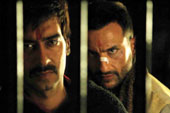 |
| TRAGIC FLAW: A scene from Omkara |
First it was Maqbool. And now it’s Omkara. Verily, it’s raining Shakespeare from Vishal Bharadwaj’s oeuvre these days. But before you begin to call Bharadwaj Bollywood’s premier Shakespearewallah, bear in mind the fact that the Hindi film industry has been looking to the Bard for inspiration for decades. And Bharadwaj, the director of Maqbool (based on Macbeth) and Omkara (based on Othello), is only the latest in the long line of Indian film makers who have drawn from Shakespeare’s plays.
Says Bharadwaj, “Omkara is set in Uttar Pradesh. The writings of Shakespeare transcend time and place. They can be recreated in any form. But I am surprised by the buzz around the film. I do not know whether it is because of Shakespeare or because of my stars.”
Bharadwaj feels that the Shakespearean style of writing suits everyone. “It has so much drama. Othello has a great story and there is enough drama in it. Any Shakespearean play can get adapted to the Indian scenario. Julius Caesar, Hamlet, The Tempest ? they are all interesting stuff. Initially, the cast found the dialogues tough going. So I recorded it in my voice and gave it to everyone to hear. We had a workshop as well and that’s how Othello became Omkara,” he says.
But Shakespeare was Greek and Latin to Bharadwaj before he took on Macbeth and adapted it to Maqbool. “After I became a film maker I chanced upon a book called Shakespeare’s Tales. They were short stories based on the plays. I read Macbeth and felt that it could be made into a Hindi film. Then I got a copy of the complete play and adapted it into Maqbool,” says Vishal.
For Naseeruddin Shah, every clich? in Hindi films seems to have come from William Shakespeare. “The story of families at war, rich boy-poor girl, mistaken identities, misunderstood parents and a boy dressing up as a girl and vice versa ? all of which are ingredients of Shakespeare’s plays ? are common in Hindi films. Maqbool was set against the backdrop of the underworld and it fitted the plot very well. Omkara’s backdrop of the political mafia was also a clincher. It is a better script than Maqbool’s,” says Shah who has acted in both films, apart from performing in almost every Shakespearean play on stage.
After Maqbool, Bharadwaj decided to tackle Othello. “I felt Othello was a good play. Naseeruddin Shah told me that it was one of the Bard’s weakest plays. But after reading the adaptation, he changed his mind,” says Bharadwaj who now feels that he can make films based on each of Shakespeare’s plays. “Shakespeare’s plays are out of copyright. Why do you think I keep going to them time and again,” he guffaws.
Gulzar, who has written the lyrics for Omkara, is a bit stunned by Bharadwaj’s adaptation, though. “I don’t know why he is calling it an adaptation. After I read it, I realised that it was as original as it gets.”
Of course, Indian cinema has been copying Shakespeare’s stories for aeons. Internationally, Shakespeare has been given credit in 642 films, with Hamlet being adapted over 50 times. In this country, Shakespeare was first adapted in the 1928 film Khoon-e-Nahak (Murder Most Foul). A silent film made by actor turned director K.B. Athavale, Khoon-e-Nahak was based on Hamlet. Seven years later, the legendary Sohrab Modi decided to cast himself as Hamlet with Saira Banu’s mother Naseem Banu playing Ophelia. The film, called Khoon Ka Khoon, was adapted by Mehdi Ahsan in Urdu and not in Hindi. It was shot with two cameras while being staged as a play.
But the most noted adaptation of Hamlet in Hindi films has been Kishore Sahu’s version where he cast himself in the lead role with Mala Sinha playing Ophelia.
Says Naseeruddin Shah, who has seen the film, “It was Mala Sinha’s first movie. The film was quite absurd, now that I think of it, but it was good that someone attempted it at least.” Incidentally, Shah was a member of the cast of the French TV film The Tragedy of Hamlet where he played Rosencrantz.
But straight adaptations apart, countless Hindi films have been inspired by Shakespeare. While traces of the Romeo and Juliet theme have been seen in films like Qayamat Se Qayamat Tak, Maine Pyaar Kiya, the Comedy of Errors motif has cropped up in movies like Jayant Desai’s Bhool Bhulaiyan in 1933, the Gulzar written and Bimal Roy produced Do Dooni Char, and Gulzar’s own adaptation called Angoor with Sanjeev Kumar and Deven Verma. Interestingly, Gulzar gave credit to Shakespeare, something that David Dhawan chose not to do in the case of his own adaptation of the Comedy of Errors theme, Bade Miyan Chhote Miyan.
“After Bimal Roy did Do Dooni Char which I had written, I myself wanted to make that into a film and made Angoor,” says Gulzar. “Shakespeare has quality drama in it while Sarat Chandra has emotion,” he adds.
Shakespeare’s The Merchant of Venice too was made into a Hindi film as Baburao Painter’s Savkari Pash and J.J. Madan’s Zaalim Saudagar in 1941. The character of the moneylender Sukhilala in the 1957 film Mother India also had shades of Shylock in it.
Meanwhile, Shashi Kapoor acted in the James Ivory-Ismail Merchant production Shakespearewallah in 1965 ? a film about a British troupe of actors who stage Shakespeare’s plays in various parts of India. That was, in fact, the real life story of actor Geoffrey Kendall’s group, Shakespearana.
But not all film makers and scriptwriters are enthusiastic about adapting Shakespeare’s plays into Hindi films. Niranjan Iyengar who has been part of films like Jism, Kal Ho Na Ho and Kabhi Alvida Na Kehna feels that Shakespeare doesn’t fit into his scheme of things. “I am more an Oscar Wilde person. I like his humour. It’s more concise,” he says.
Writer Shridhar Raghavan has a different take as well. “I think Vishal’s doing a terrific job with the Bard. So he is the best man for the job,” says Shridhar. “I would like to do something on the life of Shakespeare instead. His life was more intriguing than his plays. If you went into the question of whether or not Christopher Marlowe wrote some of his plays that could be a deadly film,” he adds.
As for Bharadwaj, it does not look as if he will sit on his Shakespearean laurels. His next film too will probably be an adaptation of one of his great plays. So will it be a comedy? “It could be A Midsummer Night’s Dream or anything else. I don’t want to say anything now,” he replies.
Well, it’s As You Like It, as William Shakespeare said long ago.











